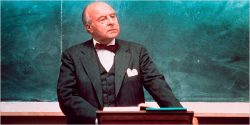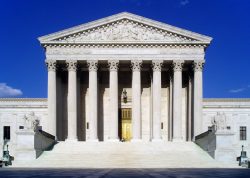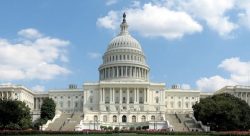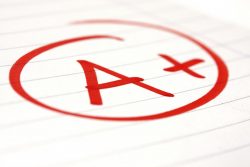Peter Augustine Lawler is Dana Professor in the Department of Government and International Studies at Berry College.

An excerpt from the book American Heresies and Higher Education Some conservatives say that the main cost-control issue in American higher education today is tenured faculty who don’t teach enough. It would be better if their lazy self-indulgence could be better controlled by more accountable administrators. Tenure, from this view, is a kind of union, […]
Read More
Photo: The Rutland Herald I’m surprised there hasn’t been more outrage about the somewhat violent silencing of Charles Murray at Middlebury. I feel more than a little threatened by the fact that a political scientist was actually injured in the line of duty. I thought I had prudently chosen a profession where that just couldn’t […]
Read More
Conservatives are climbing aboard Jonathan Haidt’s “viewpoint diversity” train, pushing for more variety of opinions and attitudes on what many call our monocultural campuses. They are, of course, admirably trying to spin the hugely successful and wonderfully diaphanous brand “diversity” for their own purposes. Haidt is not a conservative. He’s a self-described moderate, but his […]
Read More
These comments were delivered at the 2015 Lynde and Harry Bradley Foundation Symposium on “The Future of Higher Education” June 3 in Washington D.C. The event was co-sponsored by the Ethics and Public Policy Center and National Affairs. The full transcript of the symposium is here. Some conservative critics say that the main problem in American higher education […]
Read More
It’s impossible not to notice a contradiction on the pages of Minding the Campus. My friend Bill Voegeli seems to be saying that tenure makes teaching in our colleges and universities worse (“Tenure, Kipnis and the PC University,” June 22). The shameful goings on at Northwestern over Kipnis show that tenure doesn’t really protect the […]
Read More
Even Emory, a fairly elite law school, may be part of a “death spiral” from which few law schools will escape. Emory Law professor Dorothy A. Brown acknowledged that in a Washington Post article yesterday. Let me add to her observations from my vantage point as a professor of political science for over thirty-five years. […]
Read More
The Republicans’ massive victory on all levels of American politics requires them to be more than anti-Obama or anti-progressive. They must implement policies that will contribute to the flourishing of all of American life. “Reform conservatives”–such as Ramesh Ponnuru and Yuval Levin–have taken the lead in showing that Republicans have to do more than cut […]
Read More
The big academic news this week is that Princeton seems to be abandoning its war against grade inflation. It really wasn’t a war against inflation, because grades actually stabilized at a high level a while ago. The effort was to stop giving most students A’s. Princeton had barely achieved its goal, with 43% of students “earning” […]
Read More
Here’s my reaction when I saw the title of “The Great Accreditation Farce,” Peter Conn’s recent article in The Chronicle of Higher Education: Finally, someone’s telling the truth. Our system of accreditation of colleges is indeed a farce, a waste of “millions of dollars and tens of thousands of hours.” To please external examiners, faculty […]
Read More
I’ve long believed that the main threat to liberal education—real higher education, in my view—is our tendency to judge the success of academics in technical terms. Too often, social critics attack tenured humanities professors for their inefficiency and poor productivity. Though they think they’re saving higher education, these pundits are harming higher-ed more than political […]
Read More
What is the purpose of higher education? You can find seven philosophies of education in today’s conversations and arguments. The list isn’t exhaustive and there is, of course, some truth to each. 1. Aristocratic Platonism argues that leisurely contemplation is for the few and work is for the many. The few live outside the “cave,” while the […]
Read More
Employers tend to complain that the graduates of American universities are skilled in solving particular problems but “often miss the big picture.” This complaint rings true for colleges graduates in general these days, but it’s an even larger issue for M.B.A. students, who hope to ultimately ascend to leadership positions in a wide array of businesses. […]
Read More
The reason that Sandra Y.L. Korn’s article in the Harvard Crimson went viral is that she audaciously wrote what so many sophisticated Americans now think: that “academic justice” should be privileged over “academic freedom.” The Harvard undergraduate contends that self-evidently unjust opinions contradicting both the findings of academic studies and politically correct university policy should be banned […]
Read More
By Peter Augustine Lawler The president of Harvard, Drew Gilpin Faust, was asked by The Wall Street Journal to defend the skyrocketing cost of attending her university. The total residential cost, now $60,000, has risen much more quickly than the rate of inflation. She assures us that not only Harvard but the other relatively nonelite […]
Read More
The friends of “disruption” in higher education typically cite grade inflation as proof that liberal education is substance-free. They are correct to assert, as Thomas Lindsay recently did on this site, that grade inflation is a real problem. But the disrupters haven’t identified the real problem with grade inflation: It makes liberal education seem to be worth […]
Read More
The two most potent and ingenious threats to liberal education in our country today are political correctness and techno-libertarian “disruption.” Political correctness has corrupted the humanities and social sciences and politicized higher education by asserting that all inquiry is to be driven by correct opinions about justice. The great books of the past are authoritatively […]
Read More
“Disrupting” may have had its day as a pervasive buzzword, claims Judith Shulevitz in The New Republic. It is or is soon to be toast as “jargon cluttering the pages of Forbes and Harvard Business Review” and as part of the title of many a TED talk. Disruptive used to refer to students and others who had impulse-control “issues” in class. It now […]
Read More
The report from the American Academy of Arts and Sciences about the sorry state of the humanities was utterly forgettable, and Andrew Sullivan focused sharply on what’s wrong with it. But I think a bit more should be said in the service of my conservative defense of liberal education, part of which is the defense […]
Read More
As a professor of political science, I can’t help but be concerned with all the enthusiasm about “civic engagement” as some radically transformative, disruptive, “Copernican” revolution in higher education. All the literature that makes such bogus claims is rife with management-speak barely masking progressive ideology. It makes the agenda-driven proclamation that the point of higher […]
Read More
In the search for substance in the sea of edifying platitudes in commencement addresses, I came upon Ben Bernanke’s thoughtful list of ten suggestions or observations on life after graduation he gave at Princeton’s tradition-laden Baccalaureate. It’s the rare graduation address that’s clearly worthy of commentary, analysis that inevitably generates some criticism. Here is one […]
Read More
It’s hard to find a “serious” commencement speech that isn’t about remembering that there’s more to life than power and money. And that the secrets of a successful life include following your passion and finding purpose, not to mention giving back to your community. The president’s speech at Morehouse had a few of these insipid […]
Read More
Well, The Chronicle of Higher Education reports the big news that philosophy professors at San Jose State have refused to adopt a pilot program centered on the legendary Harvard professor Michael Sandel’s MOOC (Massive Open Online Course) on justice. Here are my reflections on their stand: Watching the Sandel MOOC doesn’t add anything of value […]
Read More
Cross-posted from Big Think So Peter Sacks, author of the excellent Generation X Goes to College, explains what’s really wrong with the likely MOOCification of higher education. Studies show that learning through MOOCS and related online delivery systems isn’t worse than that through the more traditional or personal ways of teaching, at least according to allegedly reliable […]
Read More
I found much to admire and little to disagree with in Sam Goldman’s defense of liberal education. Well, I was offended that he called my use of “cultural transmission” postmodern. I wasn’t offended for any good reason, of course. Putting the techno-phrase in quotes is, of course, a postmodern or cloyingly ironic “move.” It is a way […]
Read More
A big divide is showing up between conservative and libertarian criticisms of higher education. Conservatives–and I am among them–argue that higher-ed has become too vocational and libertarians say it is not vocational enough. Professor Michael Hepner of the University of Dubuque, part of an influential and cutting-edge effort to think through the causes of the […]
Read More
I’m writing in response to Yevgeniy Feyman’s challenging comments to my conservative defense of liberal education: We see more and more libertarian nudging in higher education. Consider the proposal, coming out of Florida, to incentivize students to choose the most demonstratively productive majors. They are, of course, the STEM majors–science, technology, engineering, and mathematics. Tuition […]
Read More
Plenty of liberals–and not just liberal professors–think there is a conservative conspiracy to use online education and MOOCs, to destroy genuinely higher education in this country. I see no organized conspiracy, and much of the liberal paranoia amounts to whining about the results of legitimate political defeats. Nonetheless, there is something to the thought that hostility to […]
Read More
Glenn Reynolds, perhaps the leading libertarian critic of the higher education bubble, has yet another idea for popping that bubble: What if you unbundled the “hotel” functions of a college — classrooms, dorms, student center, etc. — from the teaching function? You could basically have a college without faculty: Get your courses via MOOC, have […]
Read More
For many economists, the big point about the current higher education bubble is that it deserves to burst. College education is overpriced because colleges have been getting away with charging students for amenities that have little or nothing to do with real education. The list of amenities is long, with a lot of disagreement on […]
Read More
Cross-posted from Big Think. When even the judicious George Will is chiming in on an important policy issue, you just know the concern must be serious and supported by all the right studies. THE HIGHER EDUCATION BUBBLE, the thinking goes, is just like THE HOUSING BUBBLE.
Read More